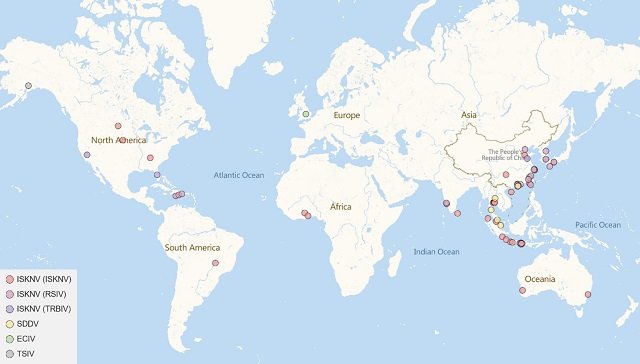
by University of Sydney
A third variant of the deadly ISKN fish virus can now be identified in a new test developed by scientists at the University of Sydney and University of Florida.
Scientists at the University of Sydney in Australia and the University of Florida in the USA have developed a new genetic test for the infectious spleen and kidney necrosis virus (ISKNV) that is deadly in fish, affecting aquaculture and ornamental fish varieties worldwide.
ISKNV has three known variants but validated tests to identify the virus only pick up two of these variants.
New research published today in PLOS One demonstrates a single test for all three genomic variants of the virus, which can kill 50 to 100 percent of fish infected.
The third variant – known as TRBIV – is an emerging pathogen and causing fish deaths in barramundi farms in Southeast Asia. While the disease caused by the virus is reportable to the World Organisation for Animal Health, TRBIV is not included in the WOAH testing requirements.
Associate Professor Joy Becker from the School of Life and Environmental Sciences at the University of Sydney is a corresponding author of the paper. She said: “The emerging TRBIV variant is a risk to the Australian barramundi industry.
“Our new diagnostic test is the most advanced in addressing WOAH requirements for test validation. It can detect all three variants of the virus with very high sensitivity and specificity.
“Once validated, we expect this diagnostic test will help keep this exotic virus out of Australia.”
While ISKNV has not been detected in wild fish stocks in Australia, it is regularly detected in ornamental fish in quarantine at the international border and in retail pet shops, according to the Australian Department of Agriculture.
Stay Always Informed
Join our communities to instantly receive the most important news, reports, and analysis from the aquaculture industry.
Associate Professor Becker said: “Exotic disease incursions are one of the biggest risks for our wild and farmed fish. The ISKN virus, which now includes the TRBIV variant, is a risk to Australian species, including barramundi and Murray cod.
“Our diagnostic test is designed to detect all three variants and provides the stringency we need to uphold Australia’s world-class biosecurity.”
Deputy Vice-Chancellor (Research) Professor Emma Johnston said: “Associate Professor Becker is an outstanding scientific leader in aquaculture and fish health.
“Working with international colleagues, her latest research is another important contribution that can help Australia – and the world – develop sustainable stewardship of our oceanic resources and support global food security.”
Associate Professor Becker said that while the virus is devastating for infected fish, the disease poses no risk to humans.
Declaration
This study was partially funded by the Australian Government through the Fisheries Research and Development Corporation (FRDC) (Project No. 2014/001 and Project No. 2016-011) and the University of Sydney. The funders had no role in study design, data collection and analysis, decision to publish, or preparation of the manuscript.
Support was also received through the Australian Government Department of Education and Training’s Enabling Growth and Innovation Project Fund for travel through its Australia-Americas PhD Research Internship Program.
The authors declare there are no actual or potential conflicts of interest.
Reference (open access)
Koda SA, Subramaniam K, Hick PM, Hall E, Waltzek TB, Becker JA (2023) Partial validation of a TaqMan quantitative polymerase chain reaction for the detection of the three genotypes of Infectious spleen and kidney necrosis virus. PLoS ONE 18(2): e0281292. https://doi.org/10.1371/journal.pone.0281292
Editor at the digital magazine AquaHoy. He holds a degree in Aquaculture Biology from the National University of Santa (UNS) and a Master’s degree in Science and Innovation Management from the Polytechnic University of Valencia, with postgraduate diplomas in Business Innovation and Innovation Management. He possesses extensive experience in the aquaculture and fisheries sector, having led the Fisheries Innovation Unit of the National Program for Innovation in Fisheries and Aquaculture (PNIPA). He has served as a senior consultant in technology watch, an innovation project formulator and advisor, and a lecturer at UNS. He is a member of the Peruvian College of Biologists and was recognized by the World Aquaculture Society (WAS) in 2016 for his contribution to aquaculture.







